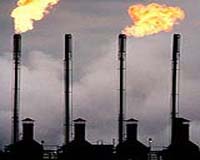 |
Beirut, Lebanon (UPI) Dec 10, 2009 The drive by foreign companies to grab a piece of the action in gas-rich Turkmenistan is reported to be producing some strange bedfellows -- like PetroSaudi, owned by the son of King Abdallah, and Merhav, an Israeli conglomerate run by former intelligence officer Yosef Maiman. According to Intelligence Online, a Paris-based Web site that covers global security issues, the companies from these longtime Middle Eastern adversaries are negotiating a partnership "through intermediaries" to explore the Serdar field that straddles the border between Turkmenistan and oil-rich Azerbaijan. It is reported to contain the equivalent of at least 1 billion barrels of recoverable oil. Turkmenistan is the world's 10th-largest gas producer. The United States, Europe, China, Russia and Iran are all clamoring for access to its vast gas fields. These contain an estimated 20 trillion cubic meters of natural gas -- enough to supply Europe for 66 years. Maiman once worked for the Mossad, Israel's foreign intelligence service, and is reputedly linked to a network of companies owned by the agency. He has been moving into Central Asia for some time, spearheading an Israeli effort to secure influence -- and a significant intelligence presence -- in the energy-rich Caspian Sea basin, the economic center of the five former Soviet republics that make up the Muslim region. The Merhav Group has been involved in Turkmenistan's natural gas industry for years. In 2004 The Jerusalem Post described Maiman, a familiar figure in the Turkmen capital of Ashgabat, as a "leading figure" in Central Asia's gas sector. According to some reports, Maiman was made a citizen of Turkmenistan by decree of the country's eccentric and authoritarian president, Saparmurad Niyazov, who died of heart disease Dec. 21, 2006. According to Intelligence Online, Maiman was behind the appointment of Israel's first ambassador to Turkmenistan, Reuven Dinia, by Foreign Minister Avigdor Lieberman recently. Dinai is another ex-Mossad officer, who once ran its Moscow station until he was expelled in 1996. Merhav has reportedly dominated foreign business in Turkmenistan, including brokering energy projects in the country. Turkmenistan and Azerbaijan are closely linked to Israeli commercial interests -- not to mention Israeli intelligence -- and Maiman appears to be well-placed to broker an agreement between them over the disputed Serdar field, which Ashgabat and Baku both claim, and secure a contract. The German-born entrepreneur, who became an Israeli citizen in 1971 and founded Merhav five years later, also has longstanding business links with Saudi Arabia. These connections may well expand as Israel and Saudi Arabia both find themselves in confrontation with nuclear-wannabe Iran. Maiman has traveled to Riyadh several times in recent years on his collection of non-Israeli passports. PetroSaudi, headed by Turki bin Abdullah bin Abdulaziz, one of the sons of the Saudi monarch, thus may be a front-runner in Turkmenistan if it cements its partnership with Merhav. They face competition from Total of France, Eni of Italy, Royal Dutch Shell, TNK-BP, Lukoil of Russia and Chevron of the United States. These companies are being welcomed in Ashgabat because the country was badly hit in April, when Russia suddenly stopped importing Turkmen natural gas. That slashed Turkmenistan's exports by 84 percent, because Russia was experiencing a gas glut. Without Russia as a customer, Turkmenistan is losing an estimated $1 billion a month. "Right now Turkmenistan is looking for any energy deal it can make with almost any player, because Russia's sudden halt to natural gas imports has cut off most of Ashgabat's cash flow," according to the U.S.-based security consultancy Stratfor. Turkmenistan does not have a viable alternative export route and, warns Stratfor, "could go bankrupt if energy revenues do not start coming in from somewhere." Moscow, which remains the dominant power in Central Asia, is unhappy about Turkmenistan's efforts to bring in new energy partners. China, with its insatiable appetite for energy to fuel its expanding economy, is likely to take Russia's place. Russia does not want to see any challenge to its influence in Central Asia. Neighboring Iran is another energy-hungry prospect. "The geography of Central Asia, the competition among its five countries for resources and the increasing competition among outside powers for Central Asian energy seem to indicate that a fight for the region's energy resources in inevitable," according to Stratfor. Share This Article With Planet Earth
Related Links Powering The World in the 21st Century at Energy-Daily.com
 Energy demand to rise 35 percent by 2030
Energy demand to rise 35 percent by 2030Irving, Texas (UPI) Dec 9, 2009 Rising energy demand over the coming two decades will require investment in all potential sources of energy, Exxon Mobil said Tuesday in its latest report. The report, "New Outlook for Energy: A View to 2030," predicted energy demand would be about 35 percent higher in 2030 than it was in 2005, and meeting that demand will require "trillions of dollars of investment and a commitment to ... read more |
|
| The content herein, unless otherwise known to be public domain, are Copyright 1995-2009 - SpaceDaily. AFP and UPI Wire Stories are copyright Agence France-Presse and United Press International. ESA Portal Reports are copyright European Space Agency. All NASA sourced material is public domain. Additional copyrights may apply in whole or part to other bona fide parties. Advertising does not imply endorsement,agreement or approval of any opinions, statements or information provided by SpaceDaily on any Web page published or hosted by SpaceDaily. Privacy Statement |